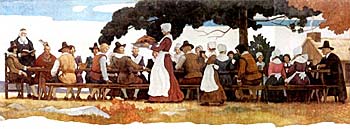Thanksgiving Day is a national holiday in the United States, and Thanksgiving 2022 occurs on Thursday, November 24. In 1621, the Plymouth colonists and the Wampanoag shared an autumn harvest feast that is acknowledged today as one of the first Thanksgiving celebrations in the colonies. For more than two centuries, days of thanksgiving were celebrated by individual colonies and states. It wasn’t until 1863, in the midst of the Civil War, that President Abraham Lincoln proclaimed a national Thanksgiving Day to be held each November.
Many Americans think of Thanksgiving as a wonderful time to celebrate getting out of school for a long weekend, and eating a great dinner. Or, maybe they think it is the start of the Christmas holiday season. What is the real meaning behind Thanksgiving? Catherine Millard writes:

We can trace this historic American Christian tradition to the year 1623. After the harvest crops were gathered in November 1623, Governor William Bradford of the 1620 Pilgrim Colony, “Plymouth Plantation” in Plymouth, Massachusetts proclaimed:
“All ye Pilgrims with your wives and little ones, do gather at the Meeting House, on the hill… there to listen to the pastor, and render Thanksgiving to the Almighty God for all His blessings.”

This is the origin of our annual Thanksgiving Day celebration. Congress of the United States has proclaimed National Days of Thanksgiving to Almighty God many times throughout the following years. On November 1, 1777, by order of Congress, the first National Thanksgiving Proclamation was proclaimed, and signed by Henry Laurens, President of Continental Congress. The third Thursday of December, 1777 was thus officially set aside:
“…for solemn thanksgiving and praise. That with one heart and one voice the good people may express the grateful feelings of their hearts, and consecrate themselves to the service of their Divine Benefactor;… and their humble and earnest supplication that it may please God, through the merits of Jesus Christ, mercifully to forgive and blot them (their manifold sins) out of remembrance… That it may please Him… to take schools and seminaries of education, so necessary for cultivating the principles of true liberty, virtue and piety under His nurturing hand, and to prosper the means of religion for the promotion and enlargement of that kingdom which consisteth of ‘righteousness, peace and joy in the Holy Ghost’…”

"…our duty as a people, with devout reverence and affectionate gratitude, to acknowledge our many and great obligations to Almighty God, and to implore Him to continue is… our duty as a people, with devout reverence and affectionate gratitude, to acknowledge our many and great obligations to Almighty God, and to implore Him to continue and confirm the blessings we experienced…"
Thursday, the 19th day of February, 1795 was thus set aside by George Washington as a National Day of Thanksgiving.

Many years later, on October 3, 1863, Abraham Lincoln proclaimed, by Act of Congress, an annual National Day of Thanksgiving "on the last Thursday of November, as a day of Thanksgiving and Praise to our beneficent Father who dwelleth in the heavens." In this Thanksgiving proclamation, our 16th President says that it is…
"…announced in the Holy Scriptures and proven by all history, that those nations are blessed whose God is the Lord… But we have forgotten God. We have forgotten the gracious hand which preserved us in peace and multiplied and enriched and strengthened us, and we have vainly imagined, by the deceitfulness of our hearts, that all these blessings were produced by some superior wisdom and virtue of our own… It has seemed to me fit and proper that God should be solemnly, reverently and gratefully acknowledged, as with one heart and one voice, by the whole American people…"